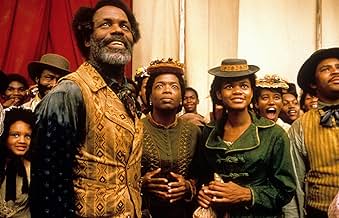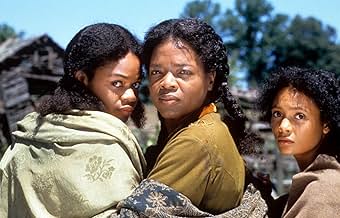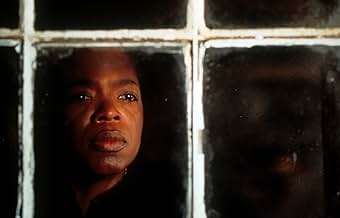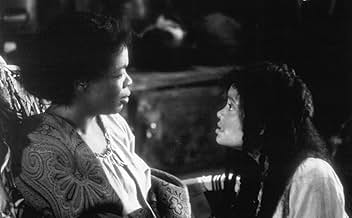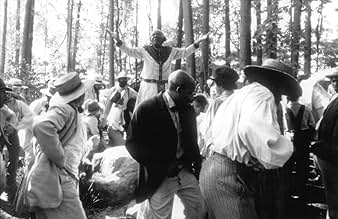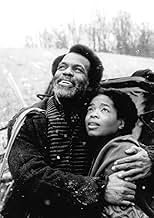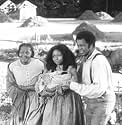IMDb-BEWERTUNG
6,1/10
9854
IHRE BEWERTUNG
Nach dem Buch von Toni Morrison, in dem ein Sklave vom Geist einer mysteriösen jungen Frau besucht wird.Nach dem Buch von Toni Morrison, in dem ein Sklave vom Geist einer mysteriösen jungen Frau besucht wird.Nach dem Buch von Toni Morrison, in dem ein Sklave vom Geist einer mysteriösen jungen Frau besucht wird.
- Für 1 Oscar nominiert
- 3 Gewinne & 24 Nominierungen insgesamt
Kessia Embry
- Amy Denver
- (as Kessia Kordelle)
LisaGay Hamilton
- Younger Sethe
- (as Lisa Gay Hamilton)
Thandiwe Newton
- Beloved
- (as Thandie Newton)
Empfohlene Bewertungen
Even though 'Beloved' got mixed reviews, I thought it was wonderful. All the performances were amazing and Jonathan Demme did a wonderful job. I think the best performances were from Oprah and Kimberly Elise. Beah Richards was exceptionally good in her small role as Baby Suggs. I have studied slavery in the past, and I knew it was very brutal. But if you pair this move with 'Amistad' you get the real picture of slavery and how horrible it was. Another good performance came from Lisa Gay Hamilton as younger Sethe, because she exemplified the true spirit of the hopeful slave. I would not recommend to those who have a faint heart or who get squeamish easily.
In some ways it was great to see how true the film was to the source material, often capturing the powerful emotions and the horrific effects slavery can have on African-Americans at the time. However, because it is so faithful it makes the film almost 3 hours long so it does drag at points.
Thandie Newton's portrayal of Beloved is rightly weird and disturbing, whilst Oprah Winfrey and Danny Glover were very convincing for me as Sethe and Paul D respectively.
The main issue with the film is that knowledge of the book is almost essential going in, as I can see how it may be difficult to grasp exactly what is going on in the narrative without that prior information. Other than that I feel it truly captures the essence of Morrison's novel and can be very thought-provoking at times.
Thandie Newton's portrayal of Beloved is rightly weird and disturbing, whilst Oprah Winfrey and Danny Glover were very convincing for me as Sethe and Paul D respectively.
The main issue with the film is that knowledge of the book is almost essential going in, as I can see how it may be difficult to grasp exactly what is going on in the narrative without that prior information. Other than that I feel it truly captures the essence of Morrison's novel and can be very thought-provoking at times.
I read Beloved in an intro English course and it took me a long while to get used to Toni Morrison's writing style. She once said in an interview that she wrote the book to be disorienting, in some ways to re-enact the feeling of the slave diaspora.
I thought the book heart-wrenching, at times gut-wrenching, and vivid. The character of Paul D never made much sense, seeming like a man waiting for something to happen, but Sethe burned off the page. What I remember most is Baby Suggs' speech at the rock, which the film has divided into three segments.
I projected Beloved for the college theater and I have to say it was long and arduous, especially if you haven't read the novel. There is no SENSE to the PAIN that goes on with these characters; in Braveheart and Titanic, we have a certain tragic pleasure in mass death or torture that we can't receive from Beloved. I read a lot of comments talking about the ghost in Beloved, but the ghost is more of a catalyst for looking into the characters than the star of the film.
I admired the time put in most. It just seemed like Demme and Tak Fujimoto, and the lighting designer as well, gave the actors the time they needed to act and sink into things: unlike traditional MTV-editing, some scenes were comprised of only one shot, usually tracking, as Paul D and Sethe in the cornfield. The score was brilliant; Portman really found a grace in stillness and the trembling African voice and the flute. It was bare but riveting at the same time.
People have said that the film went for too much shock value. That's possible- did we need the close-up of the dead child at the breast? No. But then again when we read it in the book, don't we think of it? Don't we for a split second see that image in our heads? I for one thought of much more graphic things when Morrison discussed Paul D and Beloved's night in the shed. The camera and the actors treat the world of Beloved and the audience with respect. Winfrey does seem more like someone who loves Sethe's character, than Sethe herself, but she did it for me. The sadness, the strength, emptiness, she did it, and Lisa Gay Hamilton as the young Sethe was riveting with her time in the film. The look in her eyes when Schoolteacher says "Animal" is amazing.
Danny Glover always does a good job, but he didn't really amaze me. For me, you know what you're getting with Glover, nice guy, troubled soul, easy-going with fits of rage every now and then. It's what he likes to play, and he does it well here but no surprises. The surprises are Winfrey, and Kimberly Elise especially in those crucial minutes when she decides to leave home, the fear and determination on her face. (She somehow becomes more sexual by the end of the film when she sees Paul D.) Thandie Newton is incredibly freaky and disgusting as Beloved with the exception of that ONE long gaze she gives Danny Glover that night, seduction, perfect symmetry. And Beah Richards as Baby Suggs: I wanted her to be my mother. She broke my heart with her religion: "This is the prize. This is the prize." The preaching scenes are INCREDIBLE in this film, especially since Tak Fujimoto chooses a circular tracking shot that allows them to do it all at once.
There isn't much redemption at the end. Sethe is drained and miserable. Paul D is on his own but still not totally free. I think Roger Ebert's comment put it best: the happy ending of Beloved is that the ordeal is OVER. There is no sense to the pain, but one hopes at the end that there can be healing.
I loved this film. I loved the fact that it's not hammering any one message home, but you can take things about motherhood, race, brutality, the dangers of love and commitment, freedom, and chains out with you: it's all there. And it is as beautiful as it is wrenching.
I thought the book heart-wrenching, at times gut-wrenching, and vivid. The character of Paul D never made much sense, seeming like a man waiting for something to happen, but Sethe burned off the page. What I remember most is Baby Suggs' speech at the rock, which the film has divided into three segments.
I projected Beloved for the college theater and I have to say it was long and arduous, especially if you haven't read the novel. There is no SENSE to the PAIN that goes on with these characters; in Braveheart and Titanic, we have a certain tragic pleasure in mass death or torture that we can't receive from Beloved. I read a lot of comments talking about the ghost in Beloved, but the ghost is more of a catalyst for looking into the characters than the star of the film.
I admired the time put in most. It just seemed like Demme and Tak Fujimoto, and the lighting designer as well, gave the actors the time they needed to act and sink into things: unlike traditional MTV-editing, some scenes were comprised of only one shot, usually tracking, as Paul D and Sethe in the cornfield. The score was brilliant; Portman really found a grace in stillness and the trembling African voice and the flute. It was bare but riveting at the same time.
People have said that the film went for too much shock value. That's possible- did we need the close-up of the dead child at the breast? No. But then again when we read it in the book, don't we think of it? Don't we for a split second see that image in our heads? I for one thought of much more graphic things when Morrison discussed Paul D and Beloved's night in the shed. The camera and the actors treat the world of Beloved and the audience with respect. Winfrey does seem more like someone who loves Sethe's character, than Sethe herself, but she did it for me. The sadness, the strength, emptiness, she did it, and Lisa Gay Hamilton as the young Sethe was riveting with her time in the film. The look in her eyes when Schoolteacher says "Animal" is amazing.
Danny Glover always does a good job, but he didn't really amaze me. For me, you know what you're getting with Glover, nice guy, troubled soul, easy-going with fits of rage every now and then. It's what he likes to play, and he does it well here but no surprises. The surprises are Winfrey, and Kimberly Elise especially in those crucial minutes when she decides to leave home, the fear and determination on her face. (She somehow becomes more sexual by the end of the film when she sees Paul D.) Thandie Newton is incredibly freaky and disgusting as Beloved with the exception of that ONE long gaze she gives Danny Glover that night, seduction, perfect symmetry. And Beah Richards as Baby Suggs: I wanted her to be my mother. She broke my heart with her religion: "This is the prize. This is the prize." The preaching scenes are INCREDIBLE in this film, especially since Tak Fujimoto chooses a circular tracking shot that allows them to do it all at once.
There isn't much redemption at the end. Sethe is drained and miserable. Paul D is on his own but still not totally free. I think Roger Ebert's comment put it best: the happy ending of Beloved is that the ordeal is OVER. There is no sense to the pain, but one hopes at the end that there can be healing.
I loved this film. I loved the fact that it's not hammering any one message home, but you can take things about motherhood, race, brutality, the dangers of love and commitment, freedom, and chains out with you: it's all there. And it is as beautiful as it is wrenching.
I found it difficult to understand the movie, and some of the dialogue, but it mattered little. I wish I'd read the book--perhaps I will, but I don't think so. A film must stand by itself, or it is not a film.
"Beloved" has long passages of greatness. First, it contains one of the best and most fascinating performances I've seen in years, given by Thandie Newton. She spent most of "Gridlock'd" in a coma, unfortunately, and that's the most notable role she's had until this one. Her first speaking (if you'll call it that) line is gripping, frightening, and amusing, and she plays a mental defective in a manner which I've never seen before. She has the loudest, rudest character, and many actresses would be put off by some of the things she must do throughout the film. However, our attention is also held by her quiet moments, as well as a few shots where the camera is content to gaze tranquilly into her beautiful eyes.
That camera is conducted with the supreme artistry of one of my favorite photographers, Tak Fujimoto, who was with director Jonathan Demme since the late '70s. Fujimoto is in love with earth and flesh tones here, but he also shoots his actors' eyes as if they were a part of the human body we'd never really noticed before, and wanted to give them the attention they deserved. It's a great approach to cinematography that pays off an infinite number of times, from the first major shot, of Sethe and Paul D reuniting (as Winfrey and Glover look at each other, they look not just into the camera, but directly into OUR eyes), to the last major shot, Jason Robards (God love him) staring in horror at a most unusual scene in front of Sethe's home.
This film is no "The Color Purple", with Welles-influenced camera angles and sacchirine-induced uplift. "Beloved" is a long, difficult, often off-putting film which doesn't really provide the big payoff at the end. This isn't necessarily good, but it isn't necessarily bad, either. Highlighted sequences include two truly remarkable sermons in the woods by Baby Suggs (Beah Richards--Oscar-nominated in '68 for "Guess Who's Coming to Dinner?"), a horrifying opening which features the most gruesome use of animatronics to date, and the notorious flashback which explain what has haunted Sethe all these years, and who Beloved really is.
I compare this film with "The Thin Red Line". Both come from notable directors, are based on famous novels, used huge budgets, and were very long. Both films disappointed many, many people. Most importantly, however, they both had parts which were greater than the whole, occasional strokes of genius, and were made by men who took the art of filmmaking seriously.
"Beloved" has long passages of greatness. First, it contains one of the best and most fascinating performances I've seen in years, given by Thandie Newton. She spent most of "Gridlock'd" in a coma, unfortunately, and that's the most notable role she's had until this one. Her first speaking (if you'll call it that) line is gripping, frightening, and amusing, and she plays a mental defective in a manner which I've never seen before. She has the loudest, rudest character, and many actresses would be put off by some of the things she must do throughout the film. However, our attention is also held by her quiet moments, as well as a few shots where the camera is content to gaze tranquilly into her beautiful eyes.
That camera is conducted with the supreme artistry of one of my favorite photographers, Tak Fujimoto, who was with director Jonathan Demme since the late '70s. Fujimoto is in love with earth and flesh tones here, but he also shoots his actors' eyes as if they were a part of the human body we'd never really noticed before, and wanted to give them the attention they deserved. It's a great approach to cinematography that pays off an infinite number of times, from the first major shot, of Sethe and Paul D reuniting (as Winfrey and Glover look at each other, they look not just into the camera, but directly into OUR eyes), to the last major shot, Jason Robards (God love him) staring in horror at a most unusual scene in front of Sethe's home.
This film is no "The Color Purple", with Welles-influenced camera angles and sacchirine-induced uplift. "Beloved" is a long, difficult, often off-putting film which doesn't really provide the big payoff at the end. This isn't necessarily good, but it isn't necessarily bad, either. Highlighted sequences include two truly remarkable sermons in the woods by Baby Suggs (Beah Richards--Oscar-nominated in '68 for "Guess Who's Coming to Dinner?"), a horrifying opening which features the most gruesome use of animatronics to date, and the notorious flashback which explain what has haunted Sethe all these years, and who Beloved really is.
I compare this film with "The Thin Red Line". Both come from notable directors, are based on famous novels, used huge budgets, and were very long. Both films disappointed many, many people. Most importantly, however, they both had parts which were greater than the whole, occasional strokes of genius, and were made by men who took the art of filmmaking seriously.
Beloved is one of the best movies of the last decade. I have read many, many reviews which seem to have been written by those who have little to no idea of just how complex and difficult Toni Morrison's original novel can be. Of course Beloved (the movie) will be long, and of course it will be emotionally draining and even confusing - the book was! That said, I loved the novel and the film version of it, which follows the original material almost verbatim. (To try and change the story would be to tamper needlessly with a Pulitzer and Nobel Prize-winning book). I am no Oprah nut but she obviously had a deep respect and understanding for the story, which is evident in her surprisingly understated acting. Thandie Newton was simply amazing; I am glad I watched the film if for nothing else than the chance to see her performance (which, to be honest, has helped a key facet of the book make sense for me). The production design is flawless, and, as always, Jonathan Demme proves he's more than above average as a director. If you like pulp trash and want your movies dumb, loud, and shallow, avoid the movie version of Beloved. But if you're looking for a magnificently acted and gorgeously produced film, see this movie the first chance you get. I'm very glad I did.
Wusstest du schon
- WissenswertesThandiwe Newton's African first name means, interestingly enough, "beloved."
- PatzerIn the scene with a deer in the field, a car is visible driving by in the upper right hand corner.
- Zitate
Baby Suggs: And the beat, beat, of your heart... Love it. More than the lungs that need yet to breathe free air. More than the womb, which holds life. More than the private parts that give life. Love your heart. This... this is the prize. Amen. This the prize... Amen!
- Crazy CreditsIn lieu of traditional opening credits, the movie begins with the camera moving through a cemetery to focus on a gravestone engraved with the sole word "BELOVED".
- Alternative VersionenIn the version aired on television there is a deleted scene and two alternate scenes. The TV version also removes any mention of Sethe's sons. They don't exist in the TV version. The first alternate scene is when Paul D is telling Sethe about Halle being in the loft. In the theatrical you see Paul D quoting Halle. In the TV version there is a flashback to Halle (Hill Harper) saying "The loft." The second alternate scene in the prayer group discussing how to deal with Sethe being haunted by Beloved. In the theatrical there is a line about Sethe being like batter. In the Tv version that is removed and there is a line inserted from another woman saying "I don't mind a little communication between worlds but this is invasion" and another character says "we better get to work and pray" The deleted scene added for the TV version has Stamp Paid asking Paul D if beloved is his problem and not what Sethe did.
Top-Auswahl
Melde dich zum Bewerten an und greife auf die Watchlist für personalisierte Empfehlungen zu.
- How long is Beloved?Powered by Alexa
- Why did Sethe try to kill all of her children?
- What happened to Sethe's husband, Halle? Why did he never show up?
- Why did it take so long for Sethe to realize who Beloved really was?
Details
Box Office
- Budget
- 80.000.000 $ (geschätzt)
- Bruttoertrag in den USA und Kanada
- 22.852.487 $
- Eröffnungswochenende in den USA und in Kanada
- 8.165.551 $
- 18. Okt. 1998
- Weltweiter Bruttoertrag
- 22.852.487 $
- Laufzeit2 Stunden 52 Minuten
- Farbe
- Sound-Mix
- Seitenverhältnis
- 1.85 : 1
Zu dieser Seite beitragen
Bearbeitung vorschlagen oder fehlenden Inhalt hinzufügen



